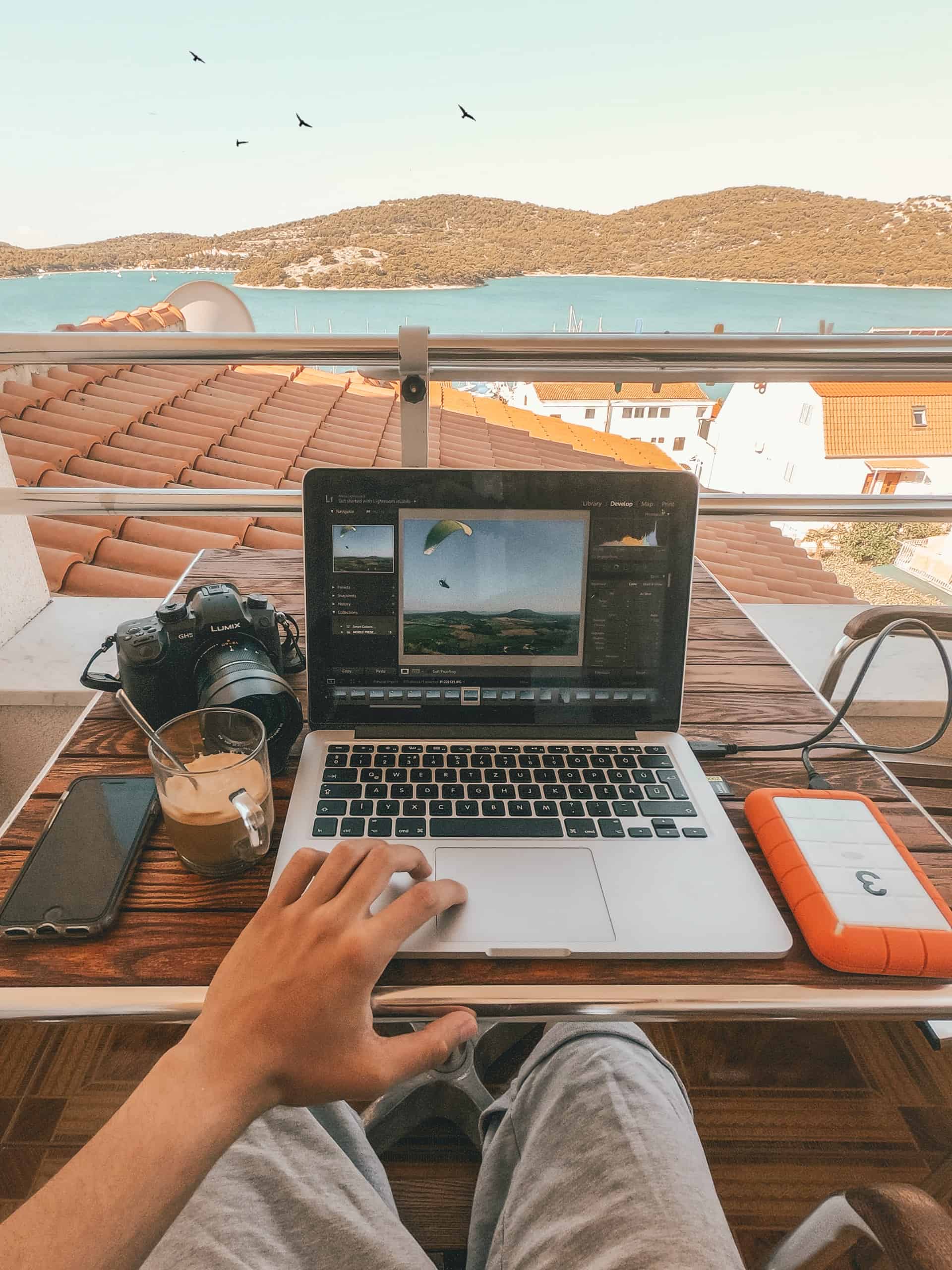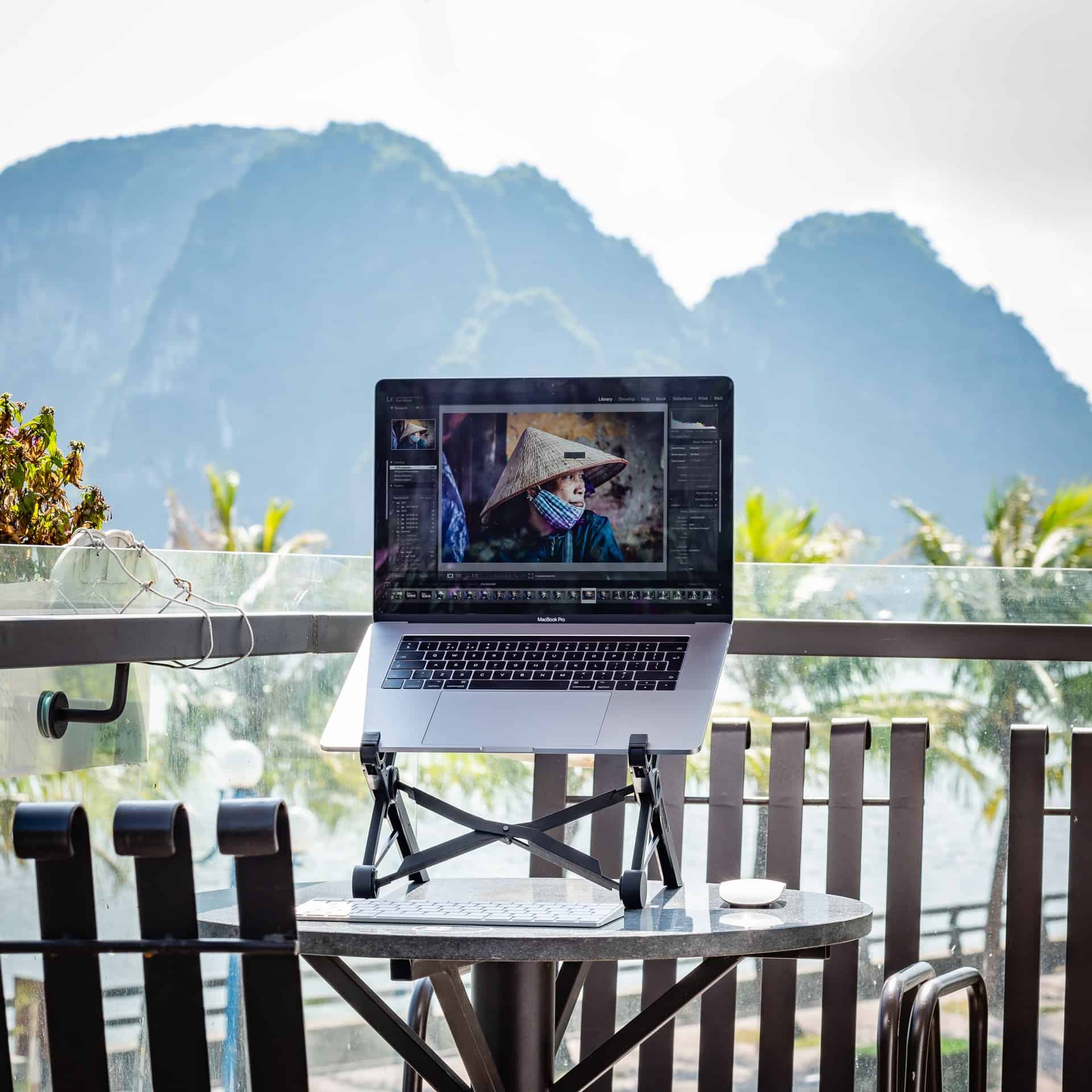Who wouldn't want to make a living from traveling the world and writing about their experiences?
Nowadays, as long as you have a serious case of wanderlust, a laptop, and an internet connection, potentially anyone can make this dream a reality.
However, there's more to it than this. Travel blogging may sound pretty straightforward, but there are many things you'll need to consider before you take the plunge and set up your website.

You'll need to consider travel-related expenses, equipment expenses, your travel writing skills, brand sponsorships, affiliate programs, and everyone's least favorite pastime – filing taxes.
Thanks to the helpful advice in this guide, you'll learn how to file taxes as a travel blogger and tax deductions you can take advantage of.
By learning all this information before you start blogging, you can save money and avoid getting into trouble with the IRS.
Table of Contents
Filing Taxes as a Blogger
If you're earning money as a blogger, even if you treat blogging as a hobby rather than a career, you need to pay taxes on this income. Failure to do so could lead to issues with the IRS.
However, filing your taxes will differ depending on whether you're blogging as a hobby, side hustle, or full-time career. Here's a quick explanation for each category.
Blogging as a Hobby
If you run a travel blog purely for pleasure rather than money, you could still find yourself making an income from this hobby through affiliate links and adverts. This means you must declare this income on your annual income tax return.
Since you won't be treating your blog as a separate business, it's relatively easy to add your income from your blog to your income tax return. You won't have to worry about setting up a business and paying corporate tax.
Differentiating between a business and a hobby can be difficult, especially if your hobby grows into a business. If you're unsure, check out this page on the IRS website.
Generally, if you're keeping accurate financial records and putting effort into making your blog profitable, then your travel blog can be considered a business.
Blogging as a Side Hustle
Blogging as a side hustle means using your blog to earn extra money to supplement your primary career. Therefore, this side hustle counts as a business in its own right.
By owning a travel blog as a side hustle, you become the sole proprietor of this business. You must attach a Schedule C to the standard Form 1040 for your income tax.
You won't need to file a separate business tax return since your blog only generates a small proportion of your annual income.
Blogging as a Full-Time Career
Once your travel blog becomes more successful, you may have the option to pursue this career full-time and devote all your time and energy to it.
If you're a full-time travel blogger, you could still choose a sole proprietorship as the structure for your business. A sole proprietorship is easy to set up, gives you complete control, and makes taxation more straightforward.
However, as your business grows, you may benefit from setting up an LLC (limited liability company).
This is because you won't be personally liable if your business experiences legal or financial problems, and you also won't fall into the trap of double taxation that can come with setting up a C corporation (this business structure would require you to pay corporate tax and income tax).
Estimated Taxes
In addition to income taxes, you'll also need to pay self-employment taxes (SE taxes) as a travel blogger. These taxes cover your Social Security and Medicare taxes – for those earning a wage, these taxes are withheld by employers.
Since you'll be self-employed, you'll need to figure out your SE taxes using Schedule SE. Find out more about calculating your SE taxes here.
As a self-employed travel blogger, you'll need to pay your taxes quarterly through estimated tax payments.
Using the previous year's financial information and Form 1040-ES, you can figure out your estimated tax payments for each deadline: April 15, June 15, September 15, and January 15.
If you end up not paying enough tax throughout the year, you could face a penalty from the IRS. However, you can adjust your quarterly payments if you think they're too high or low.

Where Do Travel Bloggers Pay Tax?
Knowing how to pay taxes as a self-employed individual is extremely important. However, if you own a travel blog, things can get a bit more complicated.
As a travel blogger, you'll naturally spend a large chunk of your time in other countries, or you may even be away from your home country for over a year if you decide to travel the world or temporarily relocate.
Unfortunately, this can make it more difficult for you to file your taxes. How and where should you file them?
Will you have to pay double the amount of taxes by paying in your home country and the country where you're temporarily working?
Paying Taxes in the U.S.
If you're hoping to avoid paying U.S. taxes during long-term travel, you're out of luck. U.S. citizens who live in another country are still subject to U.S. taxes, and the only way to stop paying U.S. taxes is to renounce your U.S. citizenship.
However, according to certain factors, you may not have to file a tax return, or you may have an exemption.
For example, if you're single and under 65 years old, you won't have to file a tax return if you earn less than $12,500 and if you're married and under 65, you only have to file a tax return if your income exceeds $25,100 when filing jointly with your spouse.
Some tax exemptions can help prevent double taxation, such as foreign earned income exclusion.
By applying for this exclusion, you can reduce your taxable income on money earned for services performed outside of the U.S. – foreign income earned indirectly (e.g., rents, dividends, business profits) is not eligible for this exclusion.
You must be a U.S. citizen who has lived in a foreign country for a complete tax year or been present there for at least 330 days in a year to apply for the foreign earned income exclusion.
Paying Taxes Overseas
When it comes to the taxes you pay in the country you're staying in, you need to check the tax laws in your country or region to find out when you need to start paying taxes and how much you'll need to pay. Unfortunately, this could mean you're subject to double taxation.
However, you can take advantage of tax treaties to reduce the tax you pay as a travel blogger. Tax treaties are agreements between countries that avoid or mitigate double taxation.
Check out this A to Z list of countries with tax treaties with the U.S. – click on each country to find out more.
Best Tax-Free Places
Another way to avoid double taxation as you live and work in different locations is to move to a country with no income tax.
If you become a resident in one of these countries, you'll significantly reduce your tax bill. These destinations are perfect for adventure seekers, cultural travel, and inspiring great content.
Some income tax-free countries include the United Arab Emirates, the Bahamas, the Cayman Islands, Bermuda, Andorra, and Monaco. However, be aware that some of these countries have high living costs or charge significant fees for a residence permit.
For example, in the Bahamas, you'll need to pay $1,000 for an annual residence permit; in the Cayman Islands, you need a yearly income of at least $120,000 to be considered for permanent residency.
When working abroad as a travel blogger, you should consider whether you have the right to work in a particular country.
Work permits and residence permits aren't the same, and the rules on living and working abroad differ from country to country.

Tax Deductions and Travel Blogging Expenses
Make sure you deduct expenses incurred through running your blogging business, so you don't pay more tax than you need to.
Anything you buy for your travel blogging business can be classed as a business expense and deducted from your taxable income, which will reduce the amount of tax you pay overall.
For example, some ordinary business expenses you could deduct from your taxable income include camera equipment, laptops, website hosting, training courses, travel expenses, and food and drink costs during business-related travel.
Working from home could even write off part of your utility bills as a business expense.
‘Ordinary and Necessary'
The critical thing to remember is that you can only take a tax deduction on something solely for your travel blogging business and not for personal use.
The IRS states that these deductions must be ‘ordinary and necessary,' meaning they must be typical for your line of work and helpful for your business.
The difficulty lies in determining what is for your business and what is personal. As a travel blogger, some of your business expenses may blur this line.
For instance, travel can be both for your blog and pleasure, or you may use your laptop for blogging and personal things. If in doubt, err on the side of caution and don't deduct the expense, as the IRS can be strict on this issue.
Don't Forget…
Finally, when filing your taxes and considering what needs to be added and deducted, don't forget about products and experiences that companies have gifted in exchange for a feature on your travel blog.
You'll need to include the monetary value of this gift in your income tax return because it counts as a form of payment during your partnership with a company.

Filing Your Taxes While Traveling
Now that you know more about how to be a self-employed travel blogger and the tax rules you should follow, you're probably wondering how to make this complicated process run more smoothly.
Filing taxes can be difficult and time-consuming, so learning some helpful tips for sorting out your finances as a travel blogger is extremely useful.
Accounting Software
One of the best tips is to manage your finances online with accounting software. These online accounting tools can be used all around the world, which means you can keep on top of your finances no matter where you're traveling.
With accounting software, you can save receipts, control your cash flow, send invoices, track business expenses, and, most importantly, keep accurate financial records to quickly complete your tax returns before the deadlines.
With more advanced software packages, you can even run in-depth reports to truly understand your blogging business's financial health.
Hiring an Accountant
As your travel blogging business grows, you may find it harder to keep complete and accurate books and file tax returns by yourself.
Hiring an experienced accountant to file your taxes for you will reduce this burden and give you peace of mind as tax deadlines approach.
By using accounting software, you can keep detailed records of your finances and easily send this information to your accountant, which will help them file your tax returns as quickly and accurately as possible.
Setting Money Aside
In addition to keeping accurate records, another essential tip for self-employed travel bloggers is to set money aside for taxes.
This is essential for anyone self-employed, but it's worth repeating that you should set aside around 30% of your income to cover your quarterly taxes or more if you want to be cautious.
You don't want to find yourself with too little cash to pay your taxes when the deadline hits!

Growing Your Travel Blog
Setting up a travel blog is as easy as creating a free website and starting to write, but turning this hobby into a profitable business is much more challenging.
Then, once you earn money from your travel blog, you have to deal with the arduous task of filing the correct taxes. However, filing taxes as a travel blogger doesn't need to fill you with dread.
By learning about your tax rules as a self-employed travel blogger and the tax deductions you can take advantage of, you can reduce the stress involved in this process and save a lot of money.
Remember to follow the valuable tips in this guide to streamline your tax filing process and grow a successful business.
______
This story is brought to you in partnership with Sage.
Planning a trip? Go Backpacking recommends:
- G Adventures for small group tours.
- Hostelworld for booking hostels.

